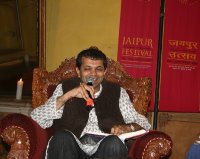Kiran Nagarkar in conversation with Shoma Choudhary
This session was a bit of a mess. The acoustics were poor and Nagarkar, who can be a very entertaining reader, seemed uninspired – it was immensely boring to sit through more than half an hour of readings from various sections of God’s Little Soldier (the sound was so bad that I’m not even sure whether he read three passages or four). The discussion that followed the reading was far too brief, largely inaudible and went off into odd tangents, such as who Nagarkar’s favourite Indian directors were (to my everlasting regret, he didn’t say Manmohan Desai – though I did hear a disembodied “Kurosawa” at one point, which probably means I missed a turn in the conversation).
(It’s a pity; I was looking forward to this session, especially since I missed his book launch in Delhi, where the conversation was also moderated by Choudhary and where Aamir Khan was in attendance.)
William Dalrymple in conversation with Mark Tully
I’m a big fan of Dalrymple’s zeal as a presenter, the way he brings 19th century Delhi to life in his writing and his talks, and the powerpoint slides that he uses to illuminate his talks on White Mughals and The Last Mughal – but after the first 50 times my enthusiasm starts to wane. The man is staggeringly good at repeating presentations word for word, inflexion by inflexion, and yet making it sound spontaneous each time.
Some of Dalrymple’s material here was an exact repeat of his presentation at the last edition of the Jaipur festival – such as the bit about Sir David Ochterlony who went for evening promenades around Delhi with his 13 Indian wives, each of whom had her own elephant. Major déjà vu also happened when I heard such sentences as “Already strange things are happening to his facial hair” – said during the slideshow of the gradual physical changes in William Fraser after he had spent a few years in India.
I’m sure this session was a delight for the first-time viewer, but for me personally there was very little new to hear or see; it didn’t help that I had attended two of his presentations around the time of the Last Mughal launch in Delhi.
Keki Daruwala, Jeet Thayil and Jane Bhandari remember the late Dom Moraes, Nissim Ezekiel and Arun Kolatkar
Easily the highlight of Day 1, even though I don’t have much of a feel for poetry. This session was as free-flowing as it could get, with Daruwala, Thayil and Bhandari taking turns to read from the work of Moraes, Ezekiel and Kolatkar, and interspersing the readings with little anecdotes and asides. Thayil was outstanding – apart from his readings, I enjoyed the photographs he showed us, such as the one of Kolatkar sitting in the inn where he received his visitors (“his apartment was so tiny he couldn’t meet people there – sometimes he had to take them out to the balcony”). He also described the poet’s voice as that of “a stoned and benevolent God who believes in man even though man has ceased to believe in him”.
“You’re allowed to laugh. These are funny poems,” Jeet said to a too-solemn audience at one point. Enjoyed that.
Suketu Mehta in conversation with Dalrymple
 Very entertaining session, though I found myself seated between a couple of schoolgirls (a whole contingent of students had come for some of the events) who were taking photographs with flash-enabled cameras and whispering loudly to each other. Stuff like “Oh shit, I clicked that guy’s [Dalrymple] picture instead of that guy’s [Mehta]! Which of them is the main guy for this session?”
Very entertaining session, though I found myself seated between a couple of schoolgirls (a whole contingent of students had come for some of the events) who were taking photographs with flash-enabled cameras and whispering loudly to each other. Stuff like “Oh shit, I clicked that guy’s [Dalrymple] picture instead of that guy’s [Mehta]! Which of them is the main guy for this session?”Mehta read out some of the funnier bits from Maximum City, proferred his thoughts on non-fiction (“it requires many years of trudging in the dirt – and a big advance”) and related stories about meeting gangsters, bar girls and movie stars for his research. One of his stories, about meeting a hitman who had turned vegetarian because he needed to keep his mind cool (“if I ate meat, I would end up killing many more people”), was the same as the one I heard from Vikram Chandra when I interviewed him here. But let’s not go down the Suketu Mehta-Vikram Chandra road...
The audience was livelier than usual. One gent was the source of much mirth for the way he worded a question: “One of the most fascinating portions of your book was about meeting Satish and Mickey – remember?” Everyone roared in laughter, but I thought it was fair enough: do the authors of Big Books really remember everything they’ve written, even if it’s based on a real encounter?
In reference to Mehta’s story about discovering that the police staged “encounter killings”, someone else asked if he felt any conscience pangs as an Indian citizen. “Well, I’m not an Indian citizen,” Mehta quipped, before quickly adding “In any case what was I supposed to do, call the cops?” Who watches the watchmen...
Hmmm. Suketu Mehta-Vikram Chandra road.... I wonder if the Mumbai crime syndicate feels to its members like you once said the literary reviewing circle felt to you... If thoughts about a closed loop and small world and so on occur to hardened criminals too. I recently attended a reading by Thayil in Bangalore, and he used that line about it being ok to laugh here too.
ReplyDelete